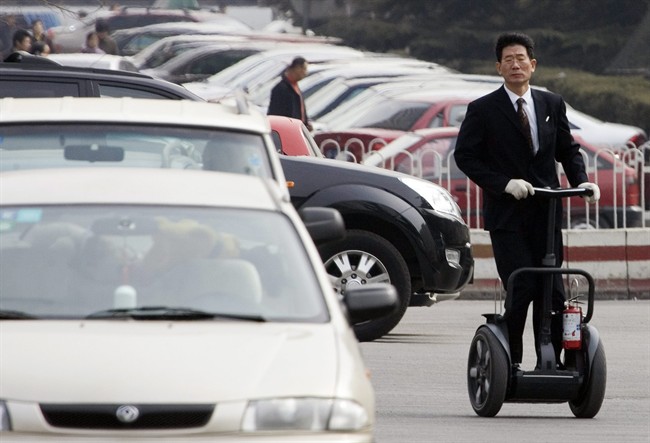VANCOUVER – A British Columbia man who alleges the province is discriminating against him by not allowing him to use a modified Segway as an assisted-mobility device will have his case heard at a provincial human rights tribunal.

Eric Jeppsen was told he would soon need an electric wheelchair after being diagnosed with a neurodegenerative disorder and his doctor prescribed the use of a Segway modified with a seat called a SegSaddle.
But the province’s Ministry of Transportation does not allow Segways on sidewalks, and Metro Vancouver’s transit authority refused to have the device on its vehicles based on the ministry’s prohibition.
A B.C. Human Rights Tribunal ruling released earlier this month says the province won’t issue the exemption because the company that makes SegSaddles says they are not considered to be a medical devices under Canadian law.
The SegSaddle is similar to a Segway, where the operator balances on two wheels, but instead of standing, the operator sits and steers with handlebars that are at waist level.
The ruling says Jeppsen’s lawyer wrote to the ministry and to the Insurance Corp. of B.C., which licenses motorized vehicles, requesting special consideration, then filed a human rights complaint when no response was received.
Tribunal member Walter Rilkoff threw out the case against ICBC saying the corporation simply interprets government law, but he said a hearing should go ahead against the Transportation Ministry.
“I am not convinced that a tribunal hearing this complaint on the merits would find that the ministry’s approach was one of being as inclusive as possible,” the ruling says.
- ‘Beast Mode’: Former Canuck Ryan Kesler back in Vancouver for Game 2 vs. Nashville
- Woman shares carjack nightmare: ‘I can’t believe this is happening in Victoria’
- No Demko but plenty of spirit as fans prepare for Game 2 of Canucks playoff run
- Caught on video: B.C. firefighter survives hit-and-run outside his own home
The ruling says that the ministry challenges whether banning the device represents an adverse impact to Jeppsen.
While the full hearing on the discrimination complaint hasn’t been heard, Rilkoff says there is merit enough to hear the man’s complaint.
“It is clear that the allegation is that Mr. Jeppsen has a serious and progressive physical disability,” the ruling says. “Use of the SegSaddle will slow the progression of his condition and allow him to build strength and maintain mobility. Failure to be able to use the device for those purposes could be an adverse impact.”
The ministry argued in the preliminary ruling that Jeppsen didn’t try to find a reasonable alternative, but Rilkoff disagreed.
“Based on the materials before me, it would appear that it is the ministry who has failed to participate in or explore accommodation,” the ruling says.



Comments